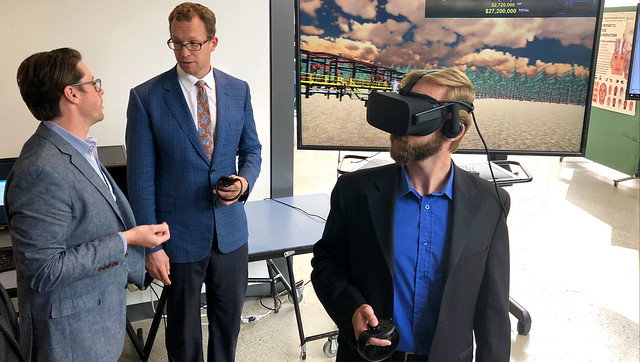This release was issued under a previous government.

Minister Schmidt speaks with Trevor Phenix, vice-president of HIVE Innovations, while University of Calgary software engineering student, Jesse Fowler, demonstrates virtual reality goggles and software created by Vizworx.
Working with post-secondary institutions in Edmonton, Calgary and Lethbridge, the province is helping more students access training opportunities that will lead to good jobs in Alberta’s growing tech sector.
Most additional seats are being added to existing tech-related post-secondary programs that offer certificates, diploma or degrees and are one to two years in duration. Accepted programs also had high student and labour market demand.
“Our government is making sure more students can train, grow and graduate with the expertise needed for good jobs in Alberta’s changing economy. Investing in more seats will ensure our booming tech sector gets the support of more highly skilled Albertans, and will help our province continue to be an economic leader.”
The additional seats are part of the government’s five-year, $50-million investment in growing Alberta’s tech sector. By 2023, at least 3,000 new tech-related seats will be added to post-secondary institutions across the province. The recently established Talent Advisory Council on Technology (TACT) will work with the tech industry, students, labour and post-secondary institutions to advise government on the best training opportunities to prepare Albertans for a more diversified and tech-savvy economy.
“The University of Calgary is home to some very well-recognized technology programs, so it’s encouraging to see that the government is increasing its support in this area. We have the talented faculty and students needed to help diversify our economy, and with additional government funds we can continue to grow in technology areas.”
“I think the tech sector is going to be growing rapidly over the next decade, so it’s nice to see increased support for post-secondary education in STEM fields. I’ve always been passionate about science and technology, and the new master of engineering in Electrical and Computer Engineering is an exciting opportunity for grad students at the University of Calgary.”
The Growth and Diversification Act is part of the government’s commitment to create an economy built to last, and is an example of how the province is preparing Albertans for a more diversified economic future. Also included in the act are a number of tax credits to stimulate additional job creation in the tech sector.
Quick facts
- For the 2018-19 school year, 406 additional technology seats have been added at colleges and universities because of investments outlined in the Growth and Diversification Act.
- Calgary will receive 216 seats:
- Southern Alberta Institute of Technology
- Information Technology Diploma – 98
- Object Oriented Software Development Certificate – 48
- University of Calgary
- Master of Engineering, Software – 40
- Bow Valley College
- Software Development Diploma – 30
- Southern Alberta Institute of Technology
- Edmonton will receive 169 seats:
- University of Alberta
- Bachelor of Science, Computing Science (After Degree) – 25
- Northern Alberta Institute of Technology
- Computer Engineering Technology – 24
- Digital Media and Information Technology – 100
- Concordia University of Edmonton
- Masters of Information Systems Assurance Management – 10
- Masters of Information Systems Security Management – 10
- University of Alberta
- Lethbridge will receive 21 seats:
- University of Lethbridge
- Masters of Science, Computer Science (co-op) 2
- Lethbridge College
- Computer Information Technology – 19
- University of Lethbridge
- Post-secondary enrolment has increased in tech-related fields 8.4 per cent over four years.
- Disciplines such as computer programming, computing science and software engineering have seen the largest increases – 30 per cent to 50 per cent over four years.